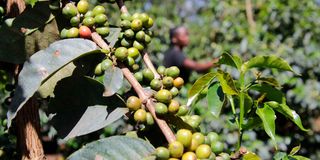Lenders seek to make health insurance loans attractive for farmers

A farmer tends to her coffee in Nyeri town.
Lenders are starting to onboard health insurance on loans targeted for farmers.
This is in an effort to change perception amid growing apathy among farmers to take up loans for fear of being auctioned should their crops fail.
A recent survey by the Central Bank of Kenya (CBK) indicates high interest rates has been a deterrent for farmers seeking loan facilities.
Results of the survey also indicate that the fear being auctioned as a result of crop failure is another reasons for loan take up loans by farmers.
“Many farmers were averse to acquiring any form of credit due to fear of exposure to possible auction upon default. In addition, rain-fed agriculture was said to be too unstable for one to seek credit, as output is often exposed to the vagaries of weather,” results of CBK’s Agricultural sector survey in January states.
Repayment rates
“Hence, farmers who relied on rainfall as their main source of water were reluctant to acquire loans due to fear of crop failure,” the results of the survey further states.
With the CBK highlighting the top factors hindering farmers from taking up credit, a report by Turaco, a Pan-African insurer, shows that lenders in the sector are warming up to onboarding health insurance on loans advanced to Kenyan farmers, which has reduced default rates in the sector while increasing repayment rates.
The report by Turaco focused on loans advanced by One Acre Fund to farmers in the country. The report indicates that loans that had insurance on-boarded on them had better repayment rates, and low default rates.
This was because most farmers tapped the insurance to access medical services when such demands arouse, as opposed to using pocket cash or borrowing as would be the case before.
Health emergencies
“Based on customer survey results and loan data, the findings suggest that insurance is a powerful tool to boost financial resiliency and provide healthcare access to the unbanked/underbanked in Africa as well as derisk lending portfolios,” Turaco says in its report.
In the survey done by the two organisations, One Acre Fund gave borrowers the option to embed insurance into its loans to protect against health emergencies that can impact repayment, where they established that two-thirds of borrowers felt repayments became a lesser burden while there was a 60 per cent decrease in default rates and 18 percent increase in loan repayment times.
“Without insurance, families across Africa are vulnerable to devastating catastrophic health risks, which can ruin them financially. This also puts lenders at greater risk of loan defaults. By embedding insurance into loans, both borrowers and lenders are protected,” said Ted Pantone, Turaco CEO.
One Acre Fund’s Director for strategy says that “By integrating insurance into our loans, we allow smallholder farmers to focus on growing their crops without the fear of getting derailed by unexpected medical bills.”





